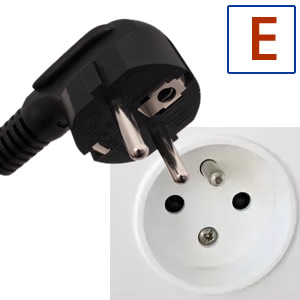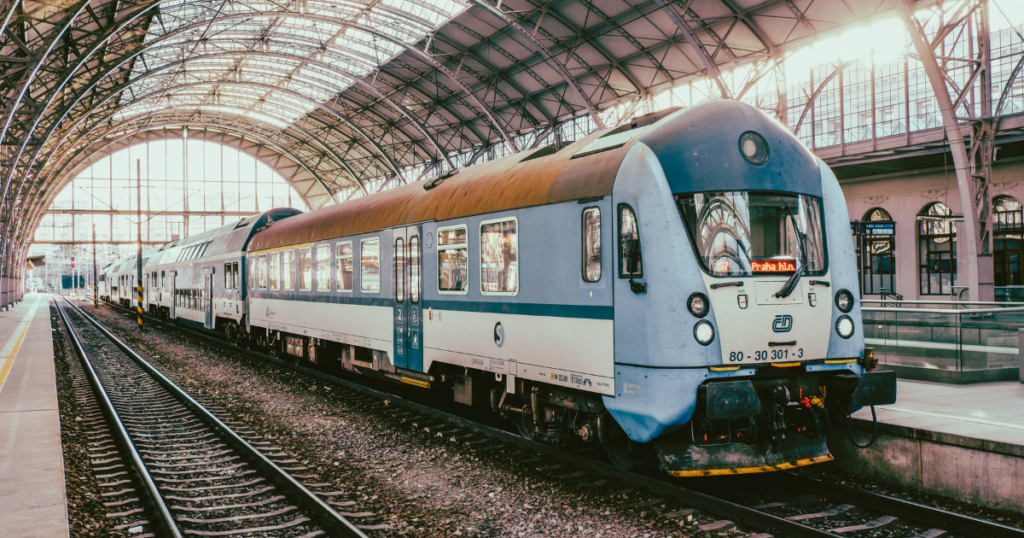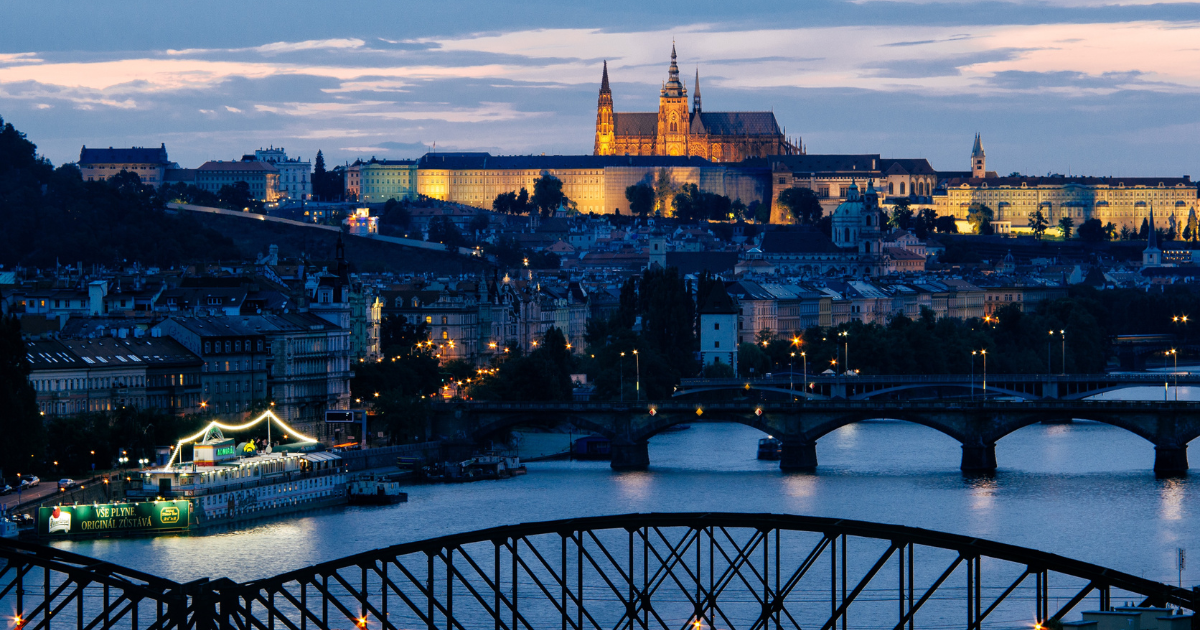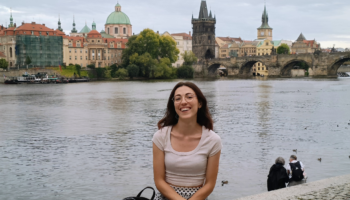Some general information you might find useful:
- Tap water is safe to drink all across the country, feel free to bring your reusable water bottle and fill it wherever. In special cases some water might not be drinkable, but there will always be a sign above the tap.
- In the Czech Republic you pay in Czech crowns. It’s generally possible to pay by card, which gives a better exchange rate and is easier. However, some shops, especially in smaller towns or villages, may not accept cards or may have a limit of, for example, CZK 100 on card payments.
- If you need to exchange some money, the best option is to go to an exchange office. The exchange rate is approximately 1 EUR- 24 CZK. You can check the current exchange rate on CNB website.
- If you want to exchange money or withdraw it from an ATM, beware of ATMs and money changers that offer unfavourable exchange rates (personally I only withdraw from ATMs of big well-known banks – Raiffeisen, Airbank, Česká spořitelna, Komerční banka, ČSOB is safe, avoid all others)
- It’s always best to check currency exchange rates. Check Google reviews or ask locals where to exchange money. Never exchange money on the street.
- The use of public toilets usually costs between 10-20 CZK.
- When shopping, don’t forget that all plastic and paper bags cost money, therefore, don’t forget to bring your own cloth bag.
- The Czech Republic has four seasons and is located in a temperate climate zone, but the weather here can be unpredictable. It’s better to pack clothes that you can layer.
- In the Czech Republic, the power plug sockets are of type E. This socket also works with plug C and with plug F if it has an additional pinhole.

How to get around
The Czech Republic has a very well-developed transport network, with metro, trams, buses, trains and other means of transport.
In Prague the metro operates from approximately 5:00 AM to midnight daily, with trains running every 2-4 minutes during peak hours and every 10-15 minutes during off-peak times. Night trams and buses take over once the metro stops running, providing service typically from midnight to around 5:00 AM.
Tickets for Prague’s public transport are time-based, not based on the number of trips. The prices are as follows:
- 30 minutes: 30 CZK
- 90 minutes: 40 CZK
- 24 hours: 120 CZK
- 72 hours: 330 CZK
Remember to validate your ticket in the yellow machines before boarding, as failing to do so could result in a fine of 1000 CZK. Most ticket machines and transport services accept contactless card payments, making it convenient to travel around the city. PID LÍTAČKA web and the app are particularly useful for up-to-date timetables and ticket information and purchase.
- Will you be traveling around Czechia? Download the IDOS app. This app will search for public transport connections across the country as well as in individual cities. You can change the main language to English and buy a ticket in the app.
- You can use bikesharing app Rekola to discover Prague, Brno or other cities in more interesting way.
- In Prague, Pilsen, Brno and some other large cities, public transport has ticket machines where you can pay for your ticket directly with your card. You must have a valid ticket when boarding public transport to avoid being fined.
- Keep in mind that night transport is not available everywhere in the Czech Republic.
- For longer journeys within the Czech Republic, you can use transport companies such as České dráhy, Arriva, RegioJet or Flixbus.
- Tram tracks cannot be crossed anywhere other than in the designated points, and they always have priority on the road, so be careful.
- Make sure you are aware of the distance as some routes are doable on foot but may appear further on the map than they are in reality.
- If you find yourself in a situation where you need to use a taxi, it’s best to use Bolt, Uber or Liftago.
If you have a student ID, make sure to have an ISIC, an International Student Identification Card. You can request it here and bring it with you, you’ll get cheaper tickets and also sometimes various discounts for entertainment, cultural and free time activities. In the Czech Republic, only local student IDs or that ISIC are accepted.

Grocery stores and restaurants
- In the Czech Republic, you can choose from several stores such as Lidl (own brand goods – cheaper), Albert and Penny, Coop (in villages and small towns), Tesco, Billa (more expensive), Globus (only a few in the Czech Republic, large selection)
- There’s a food court in every mall, and you can find normal restaurants.
- If you want to eat at a restaurant and you don’t know where to go, I recommend searching Google reviews.
- You can try Nesnězeno, an app to save money and waste food.
- Tipping is common but not mandatory. A 10% tip is generally appreciated in restaurants, but rounding up the bill is also acceptable.
Typical meal times:
- Breakfast (Snídaně): Breakfast is usually eaten between 7:00 and 9:00.
- Lunch (Oběd): Usually served between 12:00 and 14:00. During this time, many restaurants offer a set menu at more affordable prices. Lunches are usually hearty and often start with a soup, followed by a main course, which may be meat, fish or vegetarian, served with side dishes such as potatoes, rice or salad.
- Dinner (Večeře): Dinner is eaten between 18:00 and 20:00. In the Czech Republic, restaurant kitchens usually close between 21:00 and 22:00. However, this can vary depending on the type of restaurant and its location. In larger cities such as Prague or Brno, especially in more touristic areas, some restaurants may keep their kitchens open later, until 23:00 or even midnight. In smaller towns or less touristy areas, it’s common for kitchens to close earlier, around 21:00. If you’re planning to dine out late, it’s always a good idea to check the restaurant’s closing time in advance or make a reservation.
Are you Vegan or Vegetarian?
- If you go shopping in Lidl and Albert, Tesco or Globus you will find a vegan section.
- If you’re looking for a vegan restaurant nearby. Use https://www.happycow.net/.
- Some tips for vegan restaurants in the Czech Republic:
Prague – Eaternia (VG), Palo verde (VG), Pastva (VG), Chutnej (VG), Hot plants (VG). Wanna try a vegan buffet? Go for Loving Hut (VG) or Dhaba Beas (V, VG)
Brno – Rebio (V), Forkys (VG), Vegalité (VG)
Respect quiet hours
Czechs value their peace and quiet, especially at night. Quiet hours are usually from 10 pm to 6 am. Be aware of noise levels in residential areas. Keep in mind that if you make a lot of noise, the police may be called and you may be fined.
In the Czech Republic, sirens go off on the first Wednesday of every month as part of a routine nationwide test of the emergency alert system. It happens at noon and lasts a few minutes. Don’t worry if you hear them. This is to make sure the sirens are working properly in the event of a real emergency, such as a natural disaster, fire or other public danger.
Useful telephone numbers
- Police 158
- Firefighters 150
- Ambulance 155
- Europe-wide emergency line 112.
Whenever you go to a foreign country you need to respect their laws and culture. If you learn a few Czech phrases, I’m sure it will make the locals happy.
- Yes – Ano /ʔanɔ/
- No – Ne /nɛ/
- Good day – Dobrý den /dɔbriː dɛn/ (Use when you are being polite, talking to a person you do not know.)
- Hello / Hi – Ahoj /ʔaɦɔj/ (When talking to a friend.)
- Excuse me – zdovolením / pardon /pardɔn/
- Thanks/ Thank you – Díky /ɟiːkɪ/ / Děkuju /ɟɛkuju/
Enjoy your stay in the Czech Republic! I hope you will like it here.






